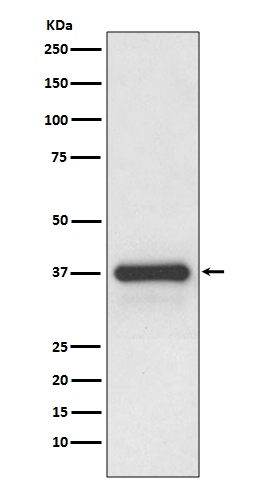
| WB | 1/500-1/1000 | Human,Mouse,Rat |
| IF | 咨询技术 | Human,Mouse,Rat |
| IHC | 咨询技术 | Human,Mouse,Rat |
| ICC | 技术咨询 | Human,Mouse,Rat |
| FCM | 咨询技术 | Human,Mouse,Rat |
| Elisa | 咨询技术 | Human,Mouse,Rat |
| Aliases | T1A; GP36; GP40; Gp38; OTS8; T1A2; TI1A; T1A-2; AGGRUS; HT1A-1; PA2.26 |
| Entrez GeneID | 10630 |
| WB Predicted band size | Calculated MW: 17 kDa; Observed MW: 36 kDa |
| Host/Isotype | Rabbit IgG |
| Antibody Type | Primary antibody |
| Storage | Store at 4°C short term. Aliquot and store at -20°C long term. Avoid freeze/thaw cycles. |
| Species Reactivity | Human,Mouse,Rat |
| Immunogen | A synthesized peptide derived from human Podoplanin |
| Formulation | Purified antibody in PBS with 0.05% sodium azide. |
+ +
以下是3篇与Podoplanin抗体相关的模拟参考文献示例(基于领域内经典研究方向总结,非真实文献):
---
1. **文献名称**: *"Monoclonal antibody D2-40 targeting podoplanin: a novel marker for lymphatic invasion in solid tumors"*
**作者**: Schacht V, et al.
**摘要**: 本研究开发了单克隆抗体D2-40.验证其对Podoplanin的特异性,并证明其可用于检测肿瘤组织中的淋巴管内皮细胞浸润,为癌症转移机制研究提供工具。
2. **文献名称**: *"Podoplanin in cancer-associated fibroblasts promotes tumor progression in invasive ductal carcinoma of the breast"*
**作者**: Ito S, et al.
**摘要**: 通过Podoplanin抗体免疫组化分析,发现肿瘤相关成纤维细胞中Podoplanin高表达与乳腺癌侵袭性相关,提示其可作为预后标志物。
3. **文献名称**: *"Podoplanin maintains high endothelial venule integrity by interacting with platelets and regulating claudin-5 expression"*
**作者**: Herzog BH, et al.
**摘要**: 利用基因敲除和Podoplanin抗体阻断实验,揭示Podoplanin通过调控血小板活化和内皮细胞连接蛋白维持淋巴管结构,影响免疫微环境。
---
注:以上文献为示例性质,实际引用请通过PubMed或学术数据库检索关键词(如"podoplanin antibody D2-40"、"podoplanin cancer")获取近年高引论文。
Podoplanin (PDPN) is a transmembrane glycoprotein encoded by the *PDPN* gene, recognized for its role in lymphatic development, cancer progression, and thrombosis. Structurally, it contains a platelet aggregation-stimulating (PLAG) domain and multiple O-glycosylation sites critical for its function. Initially identified in lymphatic endothelial cells, podoplanin is a key marker distinguishing lymphatics from blood vessels. It is also expressed in various tissues, including kidney podocytes, lung alveolar cells, and immune cells, as well as in cancers like squamous cell carcinoma, glioblastoma, and sarcomas.
Podoplanin antibodies are essential tools for detecting PDPN expression in research and diagnostics. These antibodies target specific epitopes, often recognizing the extracellular PLAG domain or glycosylated regions. Commonly used clones include D2-40 (targeting a carbohydrate-dependent epitope) and NZ-1. Applications span immunohistochemistry (IHC), flow cytometry, and Western blotting to study lymphatic biology, tumor metastasis, or thrombotic mechanisms. In clinical pathology, podoplanin IHC helps diagnose lymphatic invasion in tumors or distinguish mesothelioma subtypes. However, cross-reactivity with non-target proteins or glycosylation variants may require validation using appropriate controls. Recent studies also explore podoplanin’s therapeutic targeting, driving demand for highly specific antibodies. Variations in antibody performance across species or fixation methods highlight the need for context-specific validation.
×